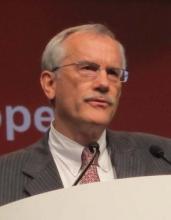ORLANDO – Obese patients coached solely over the phone and Internet lost as much weight as did those counseled in person, according to the findings of a prospective, randomized controlled trial.
Moreover, both groups maintained their weight loss during the 2-year follow-up period of the POWER (Practice-Based Opportunities for Weight Reduction) trial.
At 24 months, 38% of patients in the remote group had lost at least 5% of their initial body weight vs. 41% of the in-person group and just 19% in a control group whose weight-loss was self-directed, Dr. Lawrence J. Appel said at the annual scientific sessions of the American Heart Association.
At 24 months, the mean weight loss was –4.6 kg or 10.1 pounds in the remote group vs. –5.1 kg or 11.2 pounds in the in-person group (P = .63), and –0.8 kg or 1.7 pounds in the control group.
At no point in the study did the weight loss in the two active treatment arms differ, said Dr. Appel, professor of medicine and director of the Welch Center for Prevention, Epidemiology and Clinical Research at Johns Hopkins University in Baltimore.
The sustained weight loss observed in POWER is unprecedented. "It could be considered something of a breakthrough in weight loss," Dr. Frank Sacks, professor of cardiovascular disease prevention at Harvard School of Public Health in Boston, observed at a press briefing. Dr. Sacks was an invited discussant for the paper.
Session moderator Dr. Donald Lloyd-Jones, chair of preventive medicine at Northwestern University, Chicago, called POWER an incredibly important trial given that obesity is by far the No. 1 public health problem in the United States and will drive cardiovascular disease in the coming decades.
"This is absolutely a game changer," he said in an interview. "To see a scalable, very inexpensive therapy, that can be done at arm’s length without too much [intensity] from the provider side, and yet fully engage patients in the process of their weight loss is a very exciting development."
The trial enrolled 415 obese patients with at least one cardiovascular risk factor and a mean weight of 103 kg and mean body mass index of 37 kg/m2.
Patients assigned to the remote group had to enter their weight on the study website before being guided to other educational modules on physical exercise and calorie counting. They could also view their weight-loss goal and progress, Dr. Appel explained.
Physicians reviewed the weight progress reports and played a supportive role through tailored e-mails. Counseling was provided by telephone by employees of Healthways, a disease management promotion company, with no face-to-face contact.
The website and physician’s roles were similar in the in-person group, but these patients received counseling in group meetings, individual meetings, and via telephone from employees of Johns Hopkins.
All patients were encouraged to reduce caloric intake, follow the DASH diet, exercise at least 180 min/week and to log in to the study website at least weekly.
During the first 6 months, the remote group took part in a median of 14 of the 15 recommended phone contacts with their coach and a median of 16 of 18 recommended phone calls over the next 18 months.
The experience in the in-person group was remarkably different, Dr. Appel said. Patients took part in just 6.5 of the 12 recommended group sessions in the first 6 months and only 1 of 18 sessions over the next 18 months, with attendance at individual sessions following a similar pattern. Ultimately, the program "morphed" into a phone intervention, likely because of the convenience and flexibility the format offers, he said. The in-person group maintained 3 of 4 recommended phone contacts with their coaches in the first 6 months and 11 of 12 contacts over the next 18 months.
The study website engaged the patients, with the remote group making 23 of the 26 recommended log ins during the first six months and the in-person group making 20.5 of the 26 log-ins, Dr. Appel said. Over the next 18 months both groups logged in to the website 35 of the 72 recommended times, and visited their primary care provider just once.
During a panel discussion, Dr. Darwin Labarthe, a professor of preventive medicine at Northwestern, said the results are probably the strongest evidence to date on the ability of adults to reduce weight on a sustained basis, but suggested that further follow-up is needed postintervention. He also asked whether the degree of weight loss observed in POWER had an impact on cardiovascular risk factors.


